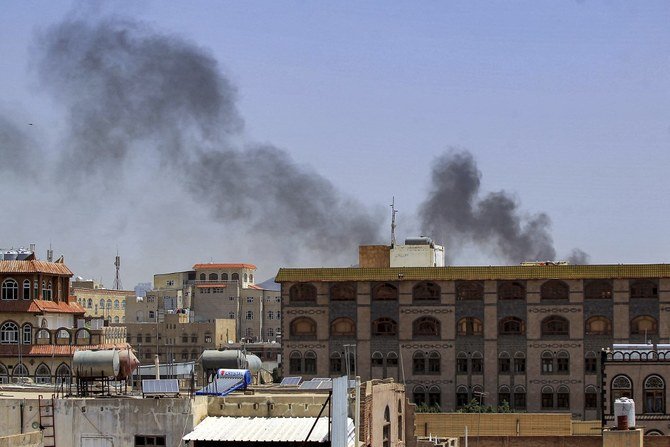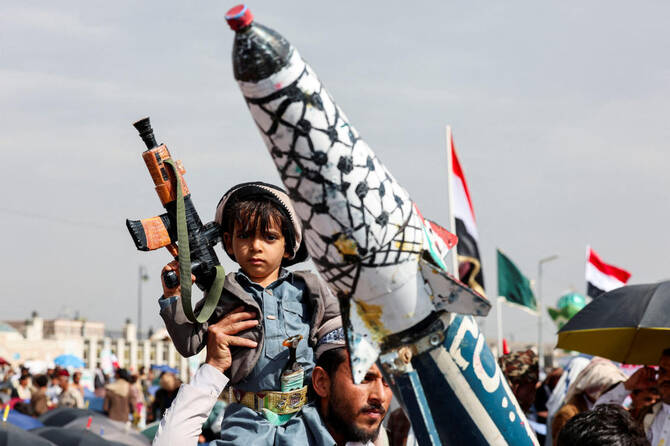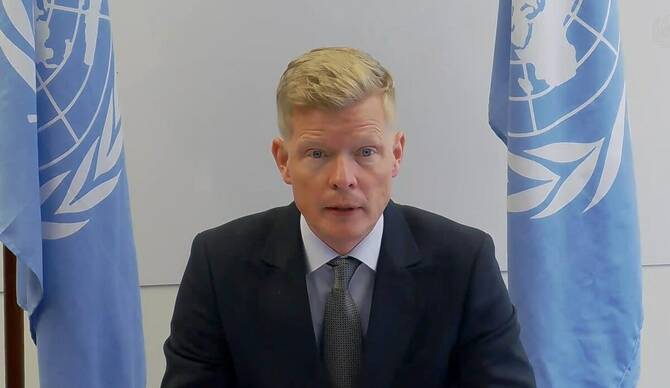Saeed Al-Batati
ALEXANDRIA: The Arab coalition in Yemen said Thursday it had stopped carrying out attacks near Sanaa or any other Yemeni city because it wanted to prepare the political ground for a peaceful settlement.
Its statement followed reports of an attack on an armored division belonging to the Houthis near the Yemeni capital.
Coalition spokesman Turki Al-Maliki denied the report: “No military operation has been carried out in the vicinity of Sanaa or any other Yemeni cities over the past period … with the aim of preparing the political ground for a peace process.”
Yemeni Foreign Minister Ahmed Awad bin Mubarak told Arab News there were favorable conditions for ending the war because the international community was pressuring the militia to agree to a more inclusive peace deal that dealt with thorny issues.
Regional and international mediators were discussing a “practical” peace initiative with the Houthis that called for achieving an immediate ceasefire, opening Sanaa airport, lifting restrictions on fuel imports through Hodeidah ports, and resuming political negotiations, he added.
“We are witnessing a great momentum for peace efforts, and there is a practical proposal on the table. The requirements to achieve peace and stop the war are now available. The practical proposal deals with our general concerns and that of the Houthis on the issue of the (Sanaa) airport and the (Hodeidah) port.”
The UN Special Envoy for Yemen Martin Griffiths, the US envoy for Yemen, Tim Lenderking, and Omani officials have engaged in extensive shuttle diplomacy between Muscat and Houthi-held Sanaa to convince the rebels to accept the deal.
Bin Mubarak said the war would stop when the Houthis embraced the new proposal as the Yemeni government had accepted it.
“The success of this proposal depends on the extent to which the Houthis interact with it.”
He explained that the government’s precondition for agreeing to the current proposal was that the four elements be implemented concurrently. These are that the Houthis end their military operations, including their offensive on the central city of Marib, as the coalition and government ease restrictions on Sanaa airport and Hodeidah seaport and stop airstrikes on Houthi targets.
“Our position on the proposal is that the four elements are one package. And the most important step to end human suffering is to stop the war.”
He had visited all the Gulf Cooperation Council states, as well as Egypt, Djibouti, Russia, and was in Europe to explain the government’s viewpoints on ending the war and to refute Houthi allegations over the humanitarian crisis.
“The main idea is to brief these pivotal countries on the Yemeni file (issue), about the nature of political developments and the Yemeni government’s view of peace, and to confirm our keenness on a just and sustainable peace that provides real opportunities to stop the war,” he said.
Bin Mubarak said the Houthis’ offensive on Marib, which started on Feb. 7, had been foiled despite their attacks. He stressed that the government had thrown all of its weight behind the “make or break” battle.
“Marib, for us, is a major issue. All (the) Yemeni state’s efforts are toward defeating the Houthis in Marib.”
He accused Iran of using military escalation in Marib as a bargaining chip in negotiations over its nuclear program. “There is intransigence (from the Houthis) and they implement the Iranian interest in making Yemen a paper (issue) among the other papers that are being discussed during Iran’s nuclear talks.”
He welcomed remarks from the US about the Houthis derailing peace efforts. “The American position comes very close to describing the problem as it is. We appreciate this understanding and this positive approach, which we believe will advance peace efforts.”
Bin Mubarak said the separatist Southern Transitional Council (STC) had not put into place the security and military components of the Riyadh Agreement, including disbanding its military units and bringing them under the government’s control.
The government implemented the political and security sides of the agreement by appointing a new governor and chief security for Aden, the minister said, adding that the STC’s reluctance to merge its military units with those of the government had pushed Yemeni Prime Minister Maeen Abdul Malik Saeed and most cabinet ministers into leaving Aden.
“We believe that this matter led to negative repercussions, including the government’s inability to perform its work in the capital.”






















